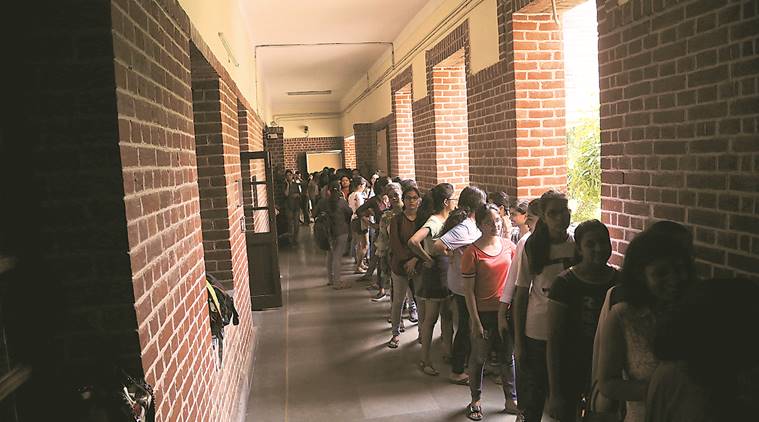
The Indian Express
‘Poor internet, no study material’: Survey finds DU open-book exam is not feasible for many
The university has been closed since mid-March, and earlier this month, the administration announced its proposal to conduct OBEs for its final-year undergraduate and postgraduate students in July.
by Sukrita BaruahA survey of over 50,000 Delhi University students, conducted by the Delhi University Teachers’ Association (DUTA), has found that 85% respondents do not feel that they are in a position to appear for online Open Book Examinations (OBE) as proposed by the university.
The university has been closed since mid-March, and earlier this month, the administration announced its proposal to conduct OBEs for its final-year undergraduate and postgraduate students in July. This was met with resistance from some teachers and students, who have argued that it is not a feasible or inclusive decision for the diverse student body — many of whom are from SC, ST, OBC and economically weaker backgrounds, and are from different parts of the country.
DUTA conducted a survey on the preparedness for such examinations to which 51,453 students had responded, of which around 92% were undergraduate students. Approximately 50% of the respondents were also those whose homes are not in Delhi.
While colleges and departments are supposed to be conducting online learning for its students, this teaching-learning exercise has been highly uneven, as has been reported by The Indian Express earlier.
This problem is particularly stark for students from Jammu and Kashmir, whose access to the internet has been interrupted for the last 10 months. Saqib Yetoo, a final-year student of St Stephen’s College from Kulgam district, said: “We only have 2G connectivity… which is not constant. I have logged in for about 30% of the online classes, but that was to just put in my attendance because it would buffer every few seconds and I couldn’t understand what was being said. PDF files of just 2-3 MB take at least half an hour to download. It has been so difficult that I submitted even my internal assignment one-and-a-half months late. To now expect us to write exams in this manner is absurd.”
Even the dissemination of study material seems to be uneven, with 11.9% respondents saying they have not received study material during the lockdown, and 38.1% saying they are not being able to access the study material sent by their teachers. The reasons for these seem to vary, with 10.9% respondents saying they have 2G internet connection, and 6.7% saying that they have no internet connection.
Less than half the respondents have a 4G connection. Additionally, only 15.5% respondents said they have laptops, with 74.1% relying only on smartphones, which are not conducive to studying academic material.
A final-year history student at Shivaji College, who studies in the Hindi medium, pointed out the language divide in the distribution of online study material. “In our class of 36 students, around 22 are Hindi-medium students. For each topic, we need three-four readings. Earlier, even if our teachers didn’t provide us Hindi material, we could go to the library and find some relevant books. Now, all study material sent by teachers is in English. In the university’s virtual learning platform, 80% of the material is in English. We are just being left far behind in this,” he said.
Mayank, a history student of Dyal Singh College, does not own a laptop and finds his capacity to study stunted by the lack of a proper reading device. “Studying long articles and books on my phone is very difficult and it gives me a headache. But I can’t access physical copies of study material as libraries are closed and academic books are too expensive to order online,” he said.
At the time the lockdown was declared, many students had returned home for the varsity’s week-long mid-semester Holi break and had not carried their study material with them — something all students The Indian Express spoke to referred to.
As many as 55.4% respondents said they do not have their reading material and class notes from before the lockdown with them and cannot access them.
In a letter to the Heads of Department, Dean Exams Vinay Gupta had stated that under the “Open-Book” mode of examination, students can refer to study material to answer questions. They would download question papers for their respective course from home, and be required to upload answers within two hours.